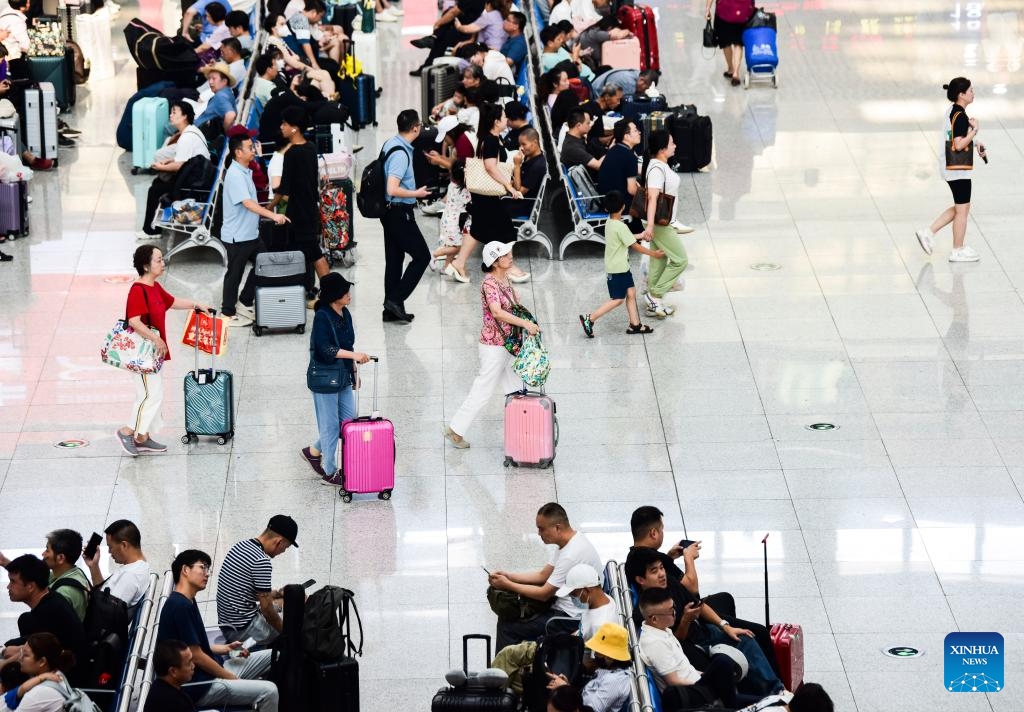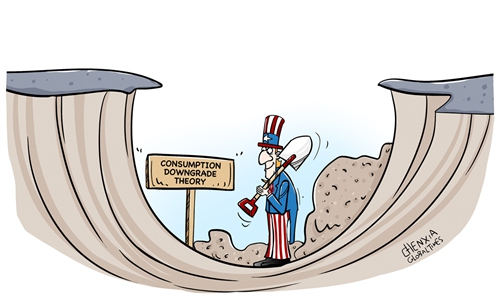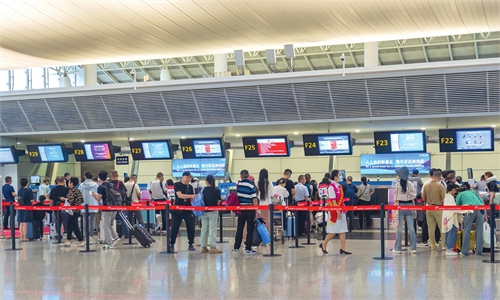Chinese economy to witness robust consumption recovery in upcoming National Day holidays

Travel rush File photo: Xinhua
From an airplane to a high-speed railway train, from Beijing's Palace Museum to Shanghai's Bund, from various shopping malls to street snack vendors, there is a throng of tourists across China who are busy hitting the road or spending on things they like. It is not hard to imagine the bustling scenes during the eight-day Mid-Autumn Festival and National Day holidays that will arrive in less than two weeks, given the current booking numbers that have been soaring since early September.
As an important gateway to observe economic vitality, the upcoming long holidays have been pinned on high hopes that domestic demand will be further released and consumption could gain more momentum with a slew of economic stimulus measures that'll be gradually taking effect.
Despite of downward pressure due to multiple factors, there's no doubt the fundamentals of the Chinese economy will remain solid; and consumption, playing its role as a driving force for economic growth, has been on a steady recovery path with consumer confidence seeing an uptick, experts said, refuting Western smearing of the country's economy.
Vitality to unfold
A sizzling tourism market could be well presumed during the Mid-Autumn Festival and National Day holidays, which extend from September 29 to October 6 this year, as such numbers as pre-orders placed have indicated.
As of Friday, domestic bookings for popular hotels in the country during the upcoming holidays jumped by 514 percent year-on-year compared with the same period in the pre-COVID 2019, data from Chinese online travel agency platform Qunar showed.
China Railway, the nation's state railway operator, said on Saturday that it sold 22.88 million train tickets on Friday, setting a new record for single-day ticket sales, indicating a strong demand for travel. Friday marks the presale of train tickets for the first day of the holidays, which are usually dubbed the "golden week" holidays.
The country is expected to see 190 million railway trips during the travel rush, according to the operator. It already exceeds the 138 million railway trips seen in the travel peak during the 2019 "golden week" before the pandemic.
Air travel, similarly, is unleashing a potentially huge travel demand.
The country is making preparations to handle 1.96 million domestic air passenger trips each day during the "golden week" holidays, up 17 percent from the same holiday period in 2019, the Civil Aviation Administration of China (CAAC) said at a press conference on Friday.
It is estimated that over 21 million people will travel by air either domestically or internationally over the long holidays, a CAAC official said, citing the presale data.
Notably, outbound travel also witnessed accelerated recovery pace. On domestic online travel agency Trip.com, the search popularity for outbound air tickets during the holidays has returned to nearly 100 percent compared with the same period in 2019. Main search destinations included Thailand, South Korea, the US, the UK and Australia.
Along with the soaring demand goes a higher travel fee. As of September 13, the economy class ticket price during the eight-day holidays averaged at 1,133 yuan ($155.75), up 32.7 percent compared with the holiday in 2019, and the price trend remained the same as in the pre-COVID period, according to travel data provider Flight Master.
Believed to maintain the continuous recovery momentum during the summer holidays, the upcoming holidays are expected to embrace a most prosperous tourism market, thus injecting a powerful impetus to the recovery of the world's second largest economy, Jiang Yiyi, deputy head of the School of Leisure Sports and Tourism at Beijing Sport University, told the Global Times on Sunday.
Compared with the May Day holidays in the first half of the year, which had already proved the nation's economic vitality in the post-COVID period, Jiang said the eight-day holidays carry more weight in terms of both scale and revenues.
"What we will see is not only more trips made that can outperform the pre-COVID level, but also expanded consumptions by people thanks to the uptick in consumer confidence with a slew of stimulus measures taking effect," Jiang said, adding that with more in their pocket, consumers could come roaring back on their spending.
Positive signs
It is needless to say that the greatest confidence to restore and expand consumption comes from the economic fundamentals, experts said, noting these fundamentals in China have not changed despite various challenges.
They also defied a smear campaign by some Western media outlets to paint the Chinese economy as being at the cusp of collapse.
As the latest official economic data showed, China's retail sales of consumer goods, a major indicator of consumption strength, went up 4.6 percent year-on-year to 3.79 trillion yuan in August. The growth rate was higher than the 2.5-percent expansion recorded in July.
The recovery of the consumer market picked up pace with rapid growth seen in services consumption, which surged 19.4 percent in the first eight months of 2023, the National Bureau of Statistics (NBS) said in a statement on Friday.
"The better-than-expected retail figure added to the positive signs that the domestic consumer market is continuously improving," Wang Qing, chief macroeconomic analyst at Golden Credit Rating International, told the Global Times on Sunday.
Separately, China's Consumer Price Index (CPI), a key indicator of inflation, witnessed a turnaround in August from a negative growth in the previous month.
Following the top leadership meeting in July to revive the economy, Chinese authorities issued 20 measures to boost domestic consumption, including support for expanding real estate and auto sales.
Wang estimated that more supportive measures will be rolled out in the remainder of the year to continue stimulating domestic consumption.
"Next, in addition to the efforts of various localities to expand consumption scenarios and optimize consumption environment, consumer coupons and subsidies will be issued on a larger scale, and taxes and fees related to bulk consumption such as autos, electronic goods and home furnishings will be further reduced," Wang said.
He noted that with forceful but targeted policy tools trickling down to the real economy, domestic macroeconomic data including consumption, investment and industrial manufacturing could come back with an overall improvement in September.
Tian Yun, a Beijing-based independent macro economy expert, said if marginal improvement effect beats expectations in September, the third quarter GDP stands the chance of hitting around 5.0 percent.
Looking ahead, consumption will continue to be a highlight for the full year's economic growth as exports have been playing a dragging role and investment, poised for increase, is still stabilizing, Tian told the Global Times on Sunday, adding that the fourth quarter could witness stronger recovery momentum if stimulus measures pick up strength.
The Chinese economy will contribute to a third of global growth this year, according to the IMF, predicting a 5.2-percent-growth for China in 2023.



